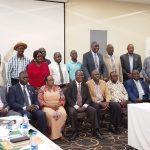The Government of Uganda is set to enhance the national identity cards (NIDs) by incorporating iris biometrics. This update aims to improve security and inclusivity in the national identification system.
Rosemary Kisembo, the Executive Director of the National Identification and Registration Authority (NIRA), announced the new feature on Monday, July 1, 2024, during a meeting with Members of Parliament on the Commissions, Statutory Authorities, and State Enterprises (COSASE) committee, chaired by Medard Ssegona (Busiro East, NUP). Kisembo explained that the addition of iris biometrics is intended to accommodate individuals who are unable to provide fingerprints due to birth defects, injuries, scars, disfigurements, or other conditions.
“For those with damaged fingerprints, we will use facial recognition and add iris scanning as an alternative biometric. While gate recognition and other advanced technologies like retina scanning exist, their costs are beyond our current budget,” Kisembo stated.
NIRA has been allocated 208 billion shillings for a new identification system. Kisembo assured that with this funding, the process of issuing IDs would become faster. “This year, we will acquire new equipment, which should reduce the ID issuance time to two to three days. Our database includes 27 million people, making it one of the largest in the region,” she noted.
This initiative is part of a broader effort to register approximately 18.1 million unregistered citizens, mainly children under seventeen, into NIRA’s database. Despite initial delays due to funding issues, Kisembo expressed optimism that the mass registration campaign would begin by July or August.
“We were supposed to start the enrollment process on June 1, but due to funding delays, we hope to begin by early July or August,” Kisembo said.
The inclusion of iris biometrics addresses concerns raised by MPs about citizens with damaged fingerprints. COSASE vice chairperson Allan Mayanja Sebunya (Nakaseke Central, NUP) highlighted the plight of individuals, such as salon workers and construction laborers, whose fingerprints are often damaged, preventing them from accessing social services that require a national ID.
“There are many Ugandans, particularly salon workers and construction laborers, whose fingerprints are damaged by their work. This has made it difficult for them to obtain national IDs. How is NIRA addressing this issue?” Mayanja asked.
Medard Ssegona, the COSASE chairperson, shared a personal experience where his thumbprint was rejected, underscoring the need for alternative biometric options.
Kisembo also emphasized the need for a permanent NIRA headquarters. Currently, NIRA operates from Kololo Independence Grounds, which is frequently disrupted by official events. “We have been requesting a permanent home for NIRA for the past four years, but it remains an unfunded priority,” she stated.
Kisembo further explained, “Our headquarters are at Kololo Independence Grounds, which is owned by the Ministry of Defence. We are merely tenants there.”
This new measure aims to ensure that all Ugandans, regardless of physical limitations, can obtain national identification cards, thereby improving access to social services and national security.




















